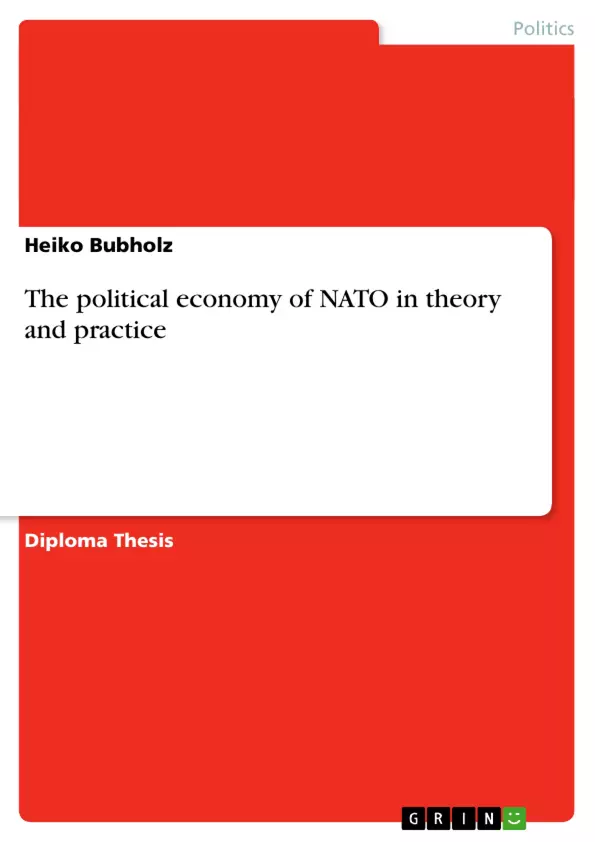The Atlantic Alliance, as a scientific subject, could be and is the primary matter of concern for representatives within the fields of political science and history. Conversely, this paper shall describe, explain and evaluate the Alliance from the perspective of the political economy.
Jaime Shea once posed the question: “Where is the debate about the future of NATO?” This paper could thus be conceived of as a contribution to this discussion. Since it originates from a thesis in economics, the analyses and examinations ought respectively apply and focus on a theoretical framework, which independently combines economic as well as methods from political science.
In 1999, Todd Sandler and Keith Hartley published a book which drew significant attention throughout the scientific community in the areas of security and economic problems. Their work, ‘The Political Economy of NATO’, dealt with several issues concerning political and economic considerations of security in general and in particular the Alliance. This publication actually initiated the motivation for personal research in the field, which finally led to this paper.
To establish a firm theoretical framework, the author does not hesitate to combine a set of equally important ideas and approaches from both political science and economics. Assumptions of the Realist school of thought of political science will be merged with economic approaches of public choice and other theoretical concepts. Yet, none of the respective viewpoints shall be given priority over the others. Instead, the aim of this paper is to provide a comprehensive view of the political and economical dimensions in the Alliance arena.
Inhaltsverzeichnis (Table of Contents)
- Introduction
- The Atlantic Alliance in Theory
- The Structure of NATO
- Treaty Analysis
- Civilian Organization and Structures
- Military Organization and Military Command Structure
- Decision-Making Process and National Engagement
- The Political Economy of Security and Alliance
- General Assumptions
- Economics of Security and Defense
- Cooperation under Security Dilemma
- Economic Theory of Alliances
- Domestic Issues and Foreign Policy
- Armaments and Defense Industry
- National Interest and Sovereignty
- The Structure of NATO
- The Atlantic Alliance in Practice
- Coalitions of the Willing
- Asymmetric Threats and Terrorism
- Cooperation with the European Union
- Instead of a Conclusion
Zielsetzung und Themenschwerpunkte (Objectives and Key Themes)
This work aims to provide a comprehensive analysis of the North Atlantic Treaty Organization (NATO) through the lens of political economy. It examines the theoretical underpinnings of the alliance, its practical implementation, and the interplay of economic factors within its security framework.
- The structure and decision-making processes within NATO
- The economic considerations influencing security and defense policy
- The role of national interest and sovereignty in alliance dynamics
- The impact of economic factors on the implementation of NATO's strategic goals
- The challenges posed by evolving security threats and the adaptation of NATO's response mechanisms
Zusammenfassung der Kapitel (Chapter Summaries)
- Introduction: This chapter sets the stage for the analysis by introducing the theoretical framework and outlining the key objectives of the study. It provides a brief historical overview of NATO and highlights the evolving challenges facing the alliance in the 21st century.
- The Atlantic Alliance in Theory: This chapter delves into the theoretical underpinnings of NATO, examining its legal foundation, organizational structure, and decision-making processes. It analyzes the political and economic considerations that shape alliance dynamics and explores the concept of collective security in the context of international relations.
- The Atlantic Alliance in Practice: This chapter examines the practical implementation of NATO's policies and strategies. It explores the evolution of the alliance's security priorities, its response to emerging threats, and the role of economic factors in shaping its operational capabilities.
Schlüsselwörter (Keywords)
The key terms and concepts explored in this work include political economy, security, defense, alliance, NATO, collective security, national interest, sovereignty, decision-making, economic factors, strategic priorities, and evolving threats.
Frequently Asked Questions
What is the focus of "The Political Economy of NATO"?
The paper evaluates the Atlantic Alliance from the perspective of political economy, combining economic theories with political science to analyze security and defense.
How is NATO's decision-making process structured?
NATO operates based on consensus among member states, involving both civilian and military command structures and national engagement.
What is the "Economic Theory of Alliances"?
It examines how member states share the costs and benefits of collective defense, often dealing with issues like burden-sharing and the "free-rider" problem.
What are "Coalitions of the Willing" in the NATO context?
They refer to groups of nations within or outside the formal NATO structure that cooperate on specific military missions when a full alliance consensus is not required or achieved.
How does NATO respond to asymmetric threats?
The alliance has adapted its strategies to counter non-traditional threats like terrorism and cyber warfare, which differ from the classic state-on-state conflicts of the Cold War.
- Citation du texte
- Heiko Bubholz (Auteur), 2003, The political economy of NATO in theory and practice, Munich, GRIN Verlag, https://www.grin.com/document/82582



